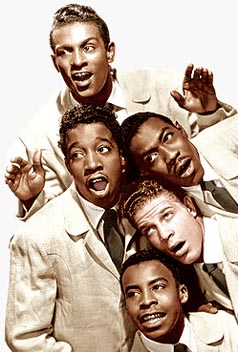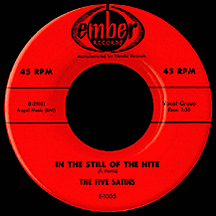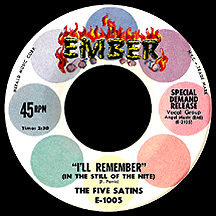THE FIVE SATINS
In the Still of the Nite
The lineup of this New Haven, Connecticut vocal quintet went through many, many changes. With the exception of founder Fred Parris, guys were joining and leaving, some coming back for a time, mixing things up to such a degree that there weren't always five singers in the group. To keep things even more interesting they used several different names over the years; even the FBI would have had a hard time tracking them down had they not all been law-abiding citizens. If you tried to collect every record the group ever put out, you'd have a large stack of singles on dozens of labels and a constant, nagging feeling that there are some you've overlooked. In the end, it all boils down to one classic, career-defining recording: "In the Still of the Nite" by The Five Satins.
Just out of high school in 1954, Parris put together his first group, The Scarlets, with pals Jim Freeman, Eddie Martin and Al Denby. He knocked around New York, approaching some of the smaller record labels that specialized in rhythm and blues. Bobby Robinson at Red Robin Records gave him a shot, recording and releasing "Dear One," which received a little airplay on city stations that summer. Three more Scarlets singles came out on Red Robin in '54 and '55, including "Cry Baby," written by Fred with Sylvester Hopkins (who put in considerable time as a vocalist with various Parris-led groups). Pat, Jean and Sylvia Bonnie, nurses at New York's Bellevue Hospital, covered the song in early '56; "Cry Baby" by The Bonnie Sisters spent some time on the national charts in February and March, peaking in the top 40 and giving Parris and Sylvester their first hit as songwriters.
When the Scarlets were dropped by Red Robin in early 1956, Parris joined the U.S. Army, but that didn't stop him from putting a new group together once basic training was finished. Lou Peebles, Stanley Dortch, Eddie Martin and Jim Freeman made up the ranks of The Five Satins, but when Peebles and Dortch were replaced by Scarlets stalwart Al Denby, it left the group with four members. Nevertheless, they decided to keep the "Five" in the name, at least for the time being. They recorded a street-savvy answer to The Mills Brothers' big-bandish hit "The Jones Boy" ('...a good boy, a nice boy, a swell boy'). Written by Freeman, "The Jones Girl" ('...she's sweet, she's fine, she made me lose my mind') had the potential to be a rock and roll hit, but they had to wait to record a B side, as Fred was scheduled to report to his Army assignment in Philadelphia. While on guard duty one night, and missing his girlfriend, he wrote "In the Still of the Nite." Within weeks he was back in New Haven on weekend leave and the quartet laid down the track in the basement of the St. Bernadette Catholic Church with Marty Kugell as producer (if showing up with a reel-to-reel recorder and turning it on is what you'd call producing). The result was a romantic ballad as honest and heartfelt as they come.
Kugell pressed the song on his ultra-small Standord label (purposely spelling the word "Nite" to avoid confusion with Cole Porter's 1937 classic "In the Still of the Night") and while it had little reach outside Connecticut, Herald Records in New York City showed interest and rereleased it within a couple of months on the company's Ember label. Several other tracks were recorded before Parris was shipped off to Japan, where he was set to fulfill the remainder of his Army tour. "The Jones Girl" was passed over in favor of flip side "In the Still of the Nite," which broke nationally in August 1956, landing in the top 30 (and R&B top ten) two months later. After that, it bounced up and down on the charts until January '57. All the while Parris was in Japan, unable to enjoy the benefits of having a stateside hit. A couple of roster switches occurred during this time; Jessie Murphy joined, not as a singer but as the group's regular pianist, at the very least making them a legitimate quintet, while Bill Baker took Fred's place as lead singer. "To the Aisle," the fourth Ember single, took "In the Still" to the next step...wedded bliss. With Baker's vocal, discernably no different from Parris's to the average listener, it put the Five Satins back into the top 30 in August '57.
Parris was discharged and returned to New Haven in early 1958, reclaiming his place as the Five Satins' leader. "A Night to Remember," the seventh Ember single, was credited to Fred Parris and the Satins (suggesting a still-fluctuating number of group members). A side project, "She's Gone (With the Wind)," appeared on the Klik label as Fred Parris and the Scarlets (with the designation Originally the Five Satins below the group's name)...and keeping track of their releases began to get more complicated. Another non-Ember single, "When Your Love Comes Along," came along in the spring of '59 on the First label.

Several more Ember singles were released before they hit the charts again with "Shadows" (written by Parris) in November 1959. The Powers That Be had pronounced doo wop dead by this time, leaving it ripe for a comeback. The Five Satins' breakthrough hit, retitled "I'll Remember (In the Still of the Nite)" (apparently a more extensive title change was needed to satisfy the Cole Porter contingent) found itself at the forefront of the successful early-'60s revival with a reissue on Ember's newly-designed "firelogs" label as a "Special Demand Release" while keeping the original catolog number (E-1005). It had a brief run on the Billboard charts in January 1960; its inclusion on the first volume of L.A. deejay and Original Sound Records owner Art Laboe's massive-selling Oldies But Goodies collection (side one, track one) didn't hurt; it returned to the chart again in January '61. In between, the group hit with "I'll Be Seeing You," a pop song composed by Irving Kahal and Sammy Fain in 1938 (and a number one hit for Bing Crosby in 1944).
Next came two Five Satins singles on MGM's Cub subsidiary, including "Your Memory." In '61, Parris and his ever-changing partners waxed a couple of singles as The Wildwoods on the Caprice and May labels. Also that year they became The New Yorkers for one single on the Wall label, the uptempo "Miss Fine," which hit the charts in May and June, the only hit under a name other than the one they were best known for. As the Five Satins once again, Fred and the guys made a little noise in the summer of 1962 with "The Masquerade is Over," one of two Chancellor singles. They made the rounds of labels large and small the next few years, appearing on United Artists, Musictone, Times Square, Warner Bros., Roulette and others.
Sometime in the mid-'60s the group decided to call it quits. Parris went solo for awhile with singles on Checker and other labels. He put together another set of Five Satins in 1969 and from that point on the group was all about rekindling the glorious memories of their '50s heyday, performing on the oldies circuit while making the occasional record. Accenting the group's emphasis on nostalgia, they made one final appearance on the charts in early 1982 as Fred Parris and the Five Satins. "Memories of Days Gone By," on Elektra Records, was a medley of '50s hits made famous by The Crests ("16 Candles"), The Penguins ("Earth Angel (Will You Be Mine)"), The Platters ("Only You (And You Alone)"), The Heartbeats ("A Thousand Miles Away"), Little Anthony and the Imperials ("Tears on My Pillow"), The Skyliners ("Since I Don't Have You") and, to top it off, their own "In the Still of the Nite."
Despite an obvious knack for uptempo rockers, romantic ballads had always been The Five Satins' stock in trade, "In the Still of the Nite" their pièce de résistance. The record, while not exactly a blockbuster at the time of its release, has held up through the years as well as any of the biggest hits of the era. In some circles it's considered the greatest of all rock and roll songs; for many years, oldies station WCBS in New York had an annual "Top 500" countdown of the all-time greatest songs as voted by the station's listeners. Year after year, the Satins' classic was right up there in the number one spot.



